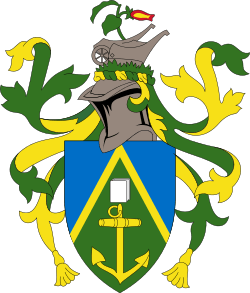Pitcairn Supreme Court
| Pitcairn Supreme Court | |
|---|---|
| Country | Pitcairn Islands |
| Location | Pitcairn Islands, New Zealand or the United Kingdom |
| Composition method | Appointed by the Governor of the Pitcairn Islands on the instructions of Her Majesty The Queen[1] |
| Authorized by | Pitcairn Constitution Order 2010 |
| Decisions are appealed to | Pitcairn Court of Appeal or the Privy Council |
| Chief Justice of the Pitcairn Islands | |
| Currently | Charles Blackie VRD |
| Since | 2004 |
 |
| This article is part of a series on the politics and government of the Pitcairn Islands |
|
The Pitcairn Supreme Court is the supreme court of the Pitcairn Islands, a British Overseas Territory. It is a superior court of record. Provisions for a supreme court were set out in amendments to the Old Constitution Order in the 1990s. The court first sat for the Pitcairn sexual assault trial of 2004, and its powers were further elaborated on in the Constitution Order 2010.[2]
There are currently three judges appointed to the court, including Charles Blackie, the Chief Justice, all of whom are judges in New Zealand. An agreement between the British and New Zealand governments was signed at Wellington on 11 October 2002 which provided for Pitcairn court cases to be heard in New Zealand.[3] This was later reinforced by legislation passed in New Zealand and the Pitcairn Islands, being the Pitcairn Trials Act 2002[4] and the Judicature Amendment Ordinance[3] respectively. Hearings of the court may also be held in the United Kingdom.[5]
Judges
Appointment
Judges are appointed by the Governor of the Pitcairn Islands under instruction from Her Majesty The Queen Elizabeth II.[1] There must be, at all time, one Chief Justice and up to four other judges or acting judges.[5]
Current judges
| Name | Date appointed | Other judicial offices | Notes |
|---|---|---|---|
| Charles Blackie (Chief Justice) | 2004 | District Courts of New Zealand | |
| Jane Lovell-Smith | 2004 | District Courts of New Zealand |
Cases
Sexual assault trial
The court first sat to try the Pitcairn sexual assault trial of 2004. The tribunal's first decision was whether to accept the defence claim that the Pitcairn Islands were not in fact legally British territory and had not been such since at least the time that the original settlers, the mutineers of the Bounty, burned the vessel in a symbolic (and, from the defence viewpoint, actual) rejection of further British sovereignty and rule. The Supreme Court ruled that the Pitcairns were in fact British territory and were generally internationally recognised to be such and that the trial was thus legal.
The Court later (October 23) found the defendants to be guilty of the sexual offences alleged against them, which created turmoil as the defendants included the islands' mayor, Steve Christian, direct descendant of leading Bounty mutineer Fletcher Christian. Steve Christian's sister was then installed as mayor until a new election could be held for a new island government.
Child pornography trial
References
- 1 2 "Pitcairn Islands". CIA World Factbook. Retrieved 1 July 2015.
- ↑ "Pitcairn Constitution Order 2010" (PDF). Pitcairn Laws. Retrieved 1 July 2015.
- 1 2 "Judicature Amendment Ordinance" (PDF). Pitcairn Laws. Retrieved 1 July 2015.
- ↑ "Pitcairn Trials Act 2002". New Zealand Legislation. Retrieved 1 July 2015.
- 1 2 "Judicature (Courts) Ordinance" (PDF). Pitcairn Laws. Retrieved 1 July 2015.